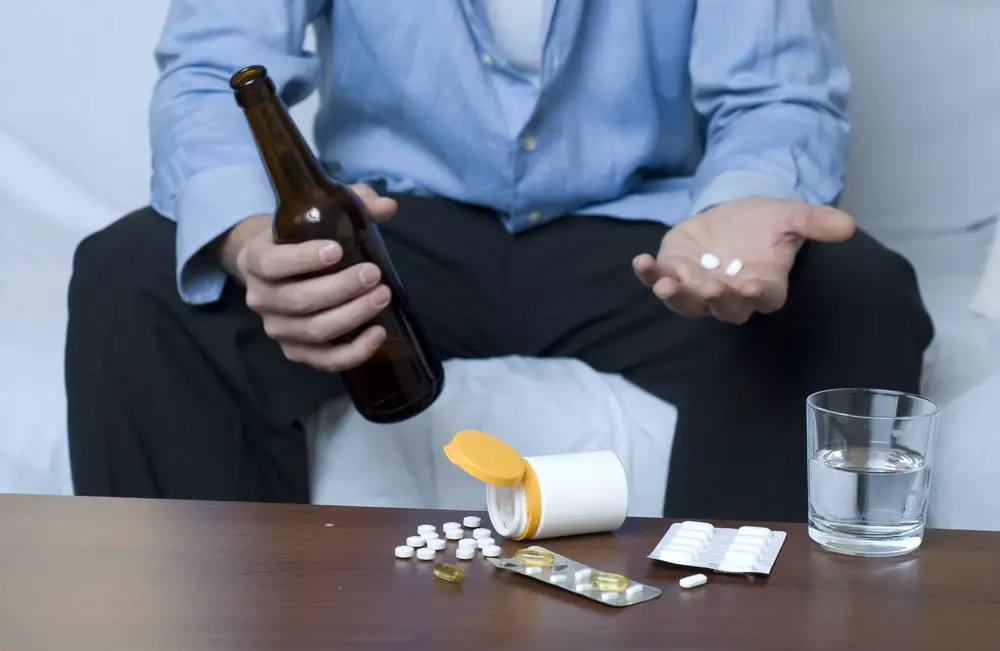As a BetterHelp affiliate, we receive compensation from BetterHelp if you purchase products or services through the links provided
Addiction is something that can impact anyone at any time. There are a lot of people who feel like addiction is only something that impacts a specific group of people. In reality, that is not the case. Because addiction can be so devastating, you need to understand the different types of addiction that are out there. That way, you can identify them, ask for help, and put yourself or your loved one in a position to recover. What are the different types of addiction that you need to know? Take a few examples below, and do not forget to reach out and ask for help if you need it.
Alcohol Addiction

One of the most common types of addiction in the world is alcohol addiction, commonly referred to as alcoholism. This condition arises when your body feels like it requires alcohol to survive. This addiction can have devastating consequences for several reasons. Firstly, alcohol can severely harm your physical health, potentially leading to liver failure if consumed endlessly, with fatal outcomes.
Moreover, withdrawal from alcohol can be perilous, with even life-threatening symptoms. The grip of alcohol addiction not only poses a risk to your health but also deprives you of valuable moments with your family and friends. If you find that alcoholism is impacting your life, it’s crucial to seek help. Exploring treatment options, including reputable rehabs in Arizona, can provide the necessary support and guidance to break free from the chains of alcohol addiction. Acknowledging the issue and reaching out for professional help is vital to recovery.
Drug Abuse

Another common type of addiction is drug abuse. Drug abuse comes in many shapes and forms. Even though some drugs are not necessarily addictive, plenty of drugs are incredibly addictive. Furthermore, just because something is sold over the counter doesn’t mean you cannot develop a dependence on it. Some most common examples of drugs that can be addicting include opioids, narcotics, and benzodiazepines. You must make sure that you take medications only if they are prescribed. You should listen to your doctor’s advice and follow his or her instructions. That way, you can make sure that you stay safe.
Gambling Addiction

There are also situations where someone can develop a gambling addiction. The main driving force behind a gambling addiction is the adrenaline rush. There are a lot of people who love the suspense that comes with gambling. Even though there is nothing wrong with enjoying a bit of poker with some friends, you must ensure that you keep your gambling under control. There are hotlines available if you feel like you need help controlling your gambling. If you do not control your gambling, you can put yourself into severe financial distress and ruin essential relationships.
Psychological Addiction

Some people may even develop something called psychological addiction. According to Diamond Rehab, the definition of psychological addiction is that it is an addiction that involves underlying thoughts and emotions. If you have developed a psychological addiction, you are addicted to a specific thought pattern. Psychological addiction often develops from underlying mental health problems. In time, people may be unable to control their emotions because they are addicted to a specific thought pattern. You need to contact a specialist who can help you control your psyche.
Kleptomania

Finally, a rather unusual mental health issue is called kleptomania. This is an addiction that someone develops when they cannot stop themselves from stealing something. There is a difference between a thief and someone who is a kleptomaniac. When someone is a kleptomaniac, they tend to steal the same things repeatedly. For example, someone may be unable to stop spilling salt shakers when they go to a restaurant. This is an example of kleptomania, and people with this condition need to get help. Otherwise, they could put themselves in severe legal jeopardy. Some professionals can help people with this concern.
Technology and Social Media Addiction

Overview: This addiction is characterized by the compulsive use of digital devices or social media platforms. It’s a modern issue, reflecting our era’s reliance on digital connectivity.
Signs: Key indicators include a constant need to check devices, neglect of personal relationships, and the inability to concentrate on work or studies. It can also manifest as anxiety when away from devices.
Management: Effective strategies involve setting strict screen time limits and regular digital detoxes. Engaging in offline activities like sports or reading helps balance digital life. Therapy, especially Cognitive Behavioral Therapy (CBT), can be beneficial in managing this addiction.
Eating Disorders

Explanation: Eating disorders are complex conditions often mistaken for lifestyle choices. They revolve around unhealthy obsessions with food, body weight, and shape.
Impact: These disorders carry serious risks like malnutrition, heart conditions, and severe emotional distress. They can also lead to social isolation and hinder personal relationships.
Approach: Treatment should be holistic, involving medical attention, nutritional counseling, and psychological support. Therapies like CBT or family-based therapy are standard. Recovery is a gradual process, often requiring long-term management.
Co-Dependency
 Definition: This condition involves an excessive emotional or psychological reliance on a partner, typically one who needs care due to an illness or addiction.
Definition: This condition involves an excessive emotional or psychological reliance on a partner, typically one who needs care due to an illness or addiction.
Characteristics: Common signs include neglecting one’s own needs to satisfy a partner, enabling addictive behavior in a partner, and a deep fear of abandonment.
Treatment: Therapy is crucial, focusing on building self-worth and independence. Support groups for co-dependents can also be a valuable resource.
Shopping Addiction
 Nature: This addiction is marked by an irresistible urge to shop and overspend money, often used as a coping mechanism for emotional distress.
Nature: This addiction is marked by an irresistible urge to shop and overspend money, often used as a coping mechanism for emotional distress.
Consequences: It can lead to substantial financial problems, strain personal relationships, and create a cycle of guilt and compulsive spending.
Strategies: Financial counseling can assist in managing debts and setting budgets. Psychological therapy can help understand and address the emotional triggers behind the addiction. Self-help groups provide peer support and practical advice.
Work Addiction

Insight: Work addiction is an obsession with work and productivity, often at the expense of personal health and relationships.
Indicators: This can manifest as working excessive hours, neglecting personal and family time, and experiencing stress-related health problems.
Balancing Act: Managing work addiction involves setting clear boundaries between work and personal life, efficient time management, and possibly therapy to address underlying issues like anxiety or low self-esteem.
Nature and Outdoor Addiction
 Context: An excessive need for outdoor activities can become problematic despite the generally positive nature of these pursuits.
Context: An excessive need for outdoor activities can become problematic despite the generally positive nature of these pursuits.
Balance: It’s important to recognize when this need starts interfering with responsibilities and relationships. Seeking a healthy balance through time management and prioritizing other aspects of life is critical. Therapy can assist in understanding the underlying reasons for this type of addiction and developing healthier habits.
Recognizing the Need for Therapy
 Understanding the Signs: It’s crucial to recognize when professional help is needed. Therapy might be necessary if you or a loved one:
Understanding the Signs: It’s crucial to recognize when professional help is needed. Therapy might be necessary if you or a loved one:
- Experience overwhelming, prolonged feelings of helplessness or hopelessness.
- Find it difficult to perform everyday activities, like concentrating at work or school.
- Worry excessively, expect the worst, or are constantly on edge.
- Engage in harmful behaviors, such as substance abuse, aggressive behavior, or self-harm.
- Feel disconnected from previously enjoyable activities or relationships.
Emotional and Physical Cues: Pay attention to signs like persistent sadness, mood swings, significant weight changes, or unexplained physical ailments. These could indicate underlying mental health issues.
Setting Goals for Therapy
 Defining Clear Objectives: Therapy is more effective with clear, achievable goals. These might include:
Defining Clear Objectives: Therapy is more effective with clear, achievable goals. These might include:
- Improving communication skills to enhance relationships.
- Developing coping strategies for anxiety or stress.
- Changing unhealthy behavior patterns, like addiction or eating disorders.
- Understanding and managing emotions better.
- Resolving past traumas or addressing unresolved grief.
Collaboration with Your Therapist: It’s a joint effort. Discuss your goals openly with your therapist, who can help refine and focus them into achievable milestones.
Recognizing Progress in Therapy
Measuring Changes: Progress in therapy isn’t always linear or easy to spot. Signs of improvement include:
- Improved mood and a more positive outlook.
- Increased self-awareness and understanding of your behaviors and emotions.
- Better stress and emotion management skills.
- Enhanced ability to cope with challenges and setbacks.
- Improved relationships with others.
Reflecting on Milestones: Celebrate small victories along the way. Acknowledge changes in your thoughts, feelings, and behaviors as progress indicators.
Regular Check-ins: Regularly review your goals with your therapist. This helps assess progress and adjust goals as needed.
Patience and Perseverance: Remember, therapy is a process. It requires time and patience. Change doesn’t happen overnight, but progress will become evident with consistent effort.
Adding this section will guide readers to understand when to seek therapy, how to set realistic goals, and how to recognize the positive changes during their therapeutic journey.
Find a Professional Who Can Help You
Because addiction comes in many shapes and forms, you need to know when to ask for help. There are some situations where people may not even realize that they need the assistance of a professional. Fortunately, there are mental health experts who can help you. A mental health professional can identify the root cause of your addiction and develop a treatment plan to address the issue. Ultimately, you must buy into your therapist’s suggestions to get the most out of your treatment sessions. This starts with finding the right therapist to meet your needs. You may want to contact your primary care doctor to see if they can refer you to an expert. To delve deeper into these insights, click to read about this IOP.
- Stress Management: What is the Relationship Between Stress and Addiction? - June 28, 2024
- Exploring Techniques to Maintain a Healthy Lifestyle without Drugs - May 28, 2024
- How Acupuncture Helps Treat Chronic Fatigue Syndrome - May 28, 2024
This site contains affiliate links to products. We will receive a commission for purchases made through these links.




